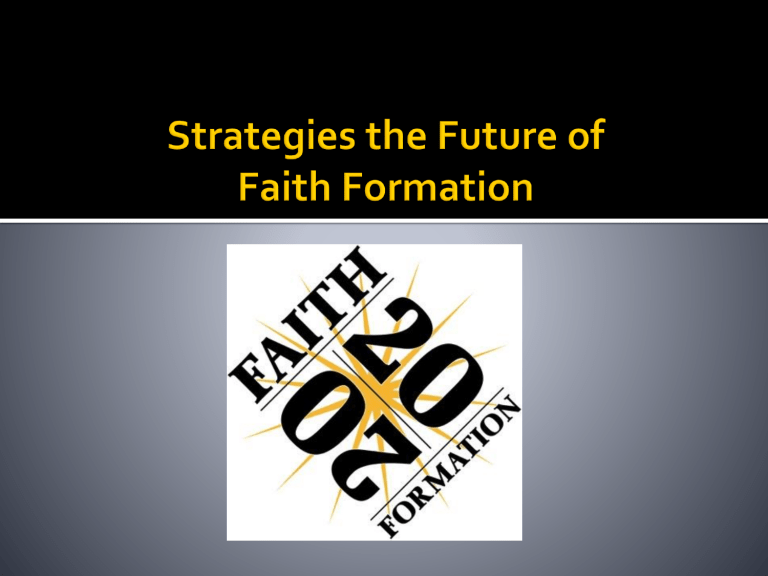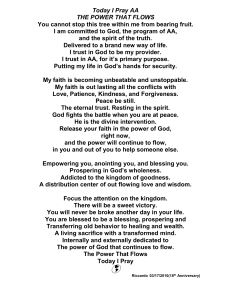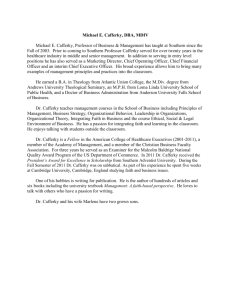File

Scenario 4
Uncommitted
&
Participating
Scenario 1
Vibrant Faith
& Active
Engagement
Scenario 3
Unaffiliated &
Uninterested
Scenario 2
Spiritual but
Not Religious
Scenario #4
+ Marriage & FF
+ Baptism & FF
+ Family faith formation in the
1 st decade of life
+ Milestones faith formation
+ Pathways to deepen faith & engagement
Scenario #1
+ Millennial Generation
+ Marriage & FF
+ Baptism & FF
+ Baby Boomers FF
+ Empowering people to share their faith
Scenario #3
+ Third Place settings
+ Family life center
+ Events (movie nights, concerts, festivals)
+ Community-based ministry
(service, recovery ministry)
Scenario #2
+ Third Place settings
+ Targeting 20-30 year olds
+ Service: local - global
+ Spiritual formation
+ Pathways to deepen faith & engagement
Scenario #4
Scenario #3
Scenario #1
Scenario #2
Scenario #4
+ Marriage & FF
+ Baptism & FF
+ Family faith formation in the 1 st decade of life
+ Milestones faith formation
+ Pathways to deepen faith
& engagement
Scenario #3
+ Third Place settings
+ Family life center
+ Events (movie nights, concerts, festivals)
+ Community-based ministry
(service, recovery ministry)
Scenario #1
+ Millennial Generation
+ Marriage & FF
+ Baptism & FF
+ Baby Boomers FF
+ Empowering people to share their faith
Scenario #2
+ Third Place settings
+ Targeting 20-30 year olds
+ Service: local - global
+ Spiritual formation
+ Pathways to deepen faith & engagement
Strategies
1.
Faith Formation through the Life of the Whole Church
2.
Faith Formation with Digital Media and Web Technologies
3.
Family Faith Formation
4.
Intergenerational Faith Formation
5.
Generational Faith Formation:
▪ iGeneration (2000 - )
▪ Millennials (1980-1999)
▪ Gen X (1964-1979)
▪ Boomers (1946-1964)
▪ Builders (1945 and earlier)
Strategies
6.
Milestones Faith Formation
7.
Faith Formation in Christian
Practice
8.
Transforming the World
9.
Spiritual Formation
10.
Multi-Ethnic Faith Formation
11.
Faith Formation for Spiritual
Seekers
Strategies
12.
Apprenticeships in Discipleship
13.
Pathways to Vibrant Faith and
Active Engagement
14.
Faith Formation in Third Place
Settings
15.
Empowering the Community to
Share their Faith
16.
Interfaith Education and Dialogue
Family Faith Formation
Strengthen family religious
socialization, especially in the first decade of life—by nurturing a vibrant faith in parents and equipping them with the skills and tools for developing faith at home.
Develop the home as a center of faith
formation by promoting foundational family faith practices: caring conversations, rituals and traditions, prayer, Bible reading, and service.
Family Faith Formation
Educate and equip parents to embed foundational faith practices into the daily experience of family life.
Develop family programs: milestone faith formation, family learning, family service
Engage families more fully in the life and ministries of the church community.
Family Faith Formation
Family Socialization: Begin faith formation early in life – at Baptism and focusing on early childhood.
family faith formation at home – family faith practices
parent formation
parent support system / mentoring
resources for the first 5-6 years of life
milestone faith formation
Generational & h a t
Lifelong faith formation that is generationally-specific , developed e the five generations in a faith community
AND intentionally intergenerational across all generations in learning, service/mission, worship, community life
h a
intergenerational learning: large e group and small group intergenerational Bible study intergenerational service projects and mission trips infuse intergenerational relationships into existing agegroup programming , e.g., mentoring
h a
Develop a faith formation curriculum for the whole community using o intergenerational learning.
s
Church Year Feasts and Seasons
Creed & Catholic Beliefs
Sacraments
Morality / “Ten Commandments for
Today”
Justice, Peace, Care for Creation,
Service, Catholic Social Teaching
Prayer Practices and Traditions
h a
Example: Church Year Feasts and Seasons
Feb Lenten Season d
Dec Advent & Christmas Seasons
(Preparing for and Birth of the Messiah) s
(Praying, Fasting, Almsgiving)
Mar Triduum
(Death of the Messiah)
April Easter Season
(Resurrection of the Messiah)
May Feast of Pentecost
(Mission of the Church)
Nov Feast of All Saints
(Communion of Saints)
Generational & h a t
Generationally-Specific
o iGeneration (2000 - ) s
Millennials (1980-1999)
Generation X (1964-1979)
Boomers (1946-1964)
Builders (up to 1945)
iGeneration & h a
networking, digital media e formed by media & visual learners ability to use technology to create a vast array of content openness to change desire for immediacy learning style: active, engaged, creative (project-centered), visual, practice & performance, digital
Millennials & Faith
Expressive Communalism
Emerging adults have embedded their lives in spiritual communities in which their desire and need for both expressive/experiential activities, whether through art, music, or service-oriented activities, and for a close-knit, physical community and communion with others are met. They are seeking to develop a balance for individualism and rational asceticism through religious experience and spiritual meaning in an embodied faith.
Millennials & Faith
The dominant characteristic was a desire for a theologically grounded belief that makes sense cognitively, combined with nonrational expressive tendencies—they want a faith that makes cognitive sense to them and that is also an expressive, embodied spiritual experience. Young adult Christians are searching for a more holistic faith than what a purely cognitive and rational approach can offer. They are seeking both a deep spiritual experience and a community experience, each of which provides them with meaning in their lives, and each of which is meaningless without the other.
(Finding Faith by Richard Flory & Donald Miller)
Millennials & Faith
Expressive Communalism expressive/experiential faith activities (worship, learning, rituals, prayer) and physical community with others a faith that makes cognitive sense to them and that is also an expressive, embodied spiritual experience
Millennials & Faith
Creating deeper community through small groups
Making a difference through service
Experiencing worship – reflecting their culture and revering and revealing God (visual, musical, artistic, experiential)
Exploring the Bible and Christian tradition with depth, questioning, and applying faith to life
Utilizing the technology to communicate the message and to connect people
Building cross-generational relationships
Forming the spiritual life – spiritual practices
& disciplines
Generation X
Desire first for community and belonging, and second for personal fulfillment. Personal fulfillment comes through commitment to the community, and through the experience of belong to such a religious/spiritual community.
Religious truth, while important to them, is not a fixed target, and is found through their religious experience, not in texts and doctrines. Truth, for Xers, is best conveyed through stories and myth, and is authenticated through the lived experience of themselves and others, rather than through the pronouncements—and propositional arguments—of external authorities.
Generation X
Generation X is moving from written text to narrative and image as a basis for religious belief. Image and story have become dominant and text background.
There is a move from the essentially individualistic spiritual quest that characterizes baby boomers to a religious/spiritual identity rooted in the larger community.
Greater individual authority in religious and moral decisions.
Generation X
Religious identity chosen through experience and study.
Choosing a specific community, rather than committing to a larger denomination.
Being experientially engaged in a religious community, not “show up and watch” interpersonal relationships with people who express and explore their religious identities in similar ways
Baby Boomers @ 60
Baby Boomers @ 60
Service : Boomers want to do something interesting and challenging. They are ready to jump into a worthwhile cause where they feel that can make a significant difference.
Boomers want service opportunities that have a mission. They want do to do things that give their lives purpose, meaning, and fulfillment. They want to know their contributions truly matter. Show Boomers how they might use their past work experiences as tools for service. Help them tap into their passion.
Baby Boomers @ 60
Spiritual Growth : Later Adulthood is a season of significant life transitions and people are more responsive to religion. A second reason is Boomers quest to find meaning and purpose in life as they enter the second half of life and evaluate the things that really provide lasting fulfillment. A third reason adults are open to faith and spiritual growth is their desire for meaningful relationships.
small group faith formation
host events that appeal to interests & needs
service opportunities
Baby Boomers @ 60
Intergenerational Relationships : Developing intergenerational relationships is one of the best ways to break age-related stereotypes, to share faith across generations, and to help the church become more unified
encourage generations to serve together
form groups according to similar interests rather than age
encourage adults to pray for young people and vice versa
host strategic intergenerational events
ask adults to tell their stories, at events or programs, and capture them on video or in print
Builder Generation
Spiritual enrichment: “spirituality of aging” programs, spiritual disciplines and practices, retreats, rituals to acknowledge life transitions
Learning: book clubs, classes and courses,
Bible study, small groups, trips
Nutrition and wellness: exercise programs, nutrition classes, healthy meals with programs
Intergenerational: activities, coaching, mentoring
Service: tutoring, service—local and global, church ministry
Community: social activities, trips, dinners, pilgrimages
Milestones
Faith Formation
Develop faith formation (learning, worship/ritual, faith practices) around lifecycle milestones, sacramental celebrations, and life transitions to deepen people’s faith, strengthen their engagement in church life, and equip them with practices for living their faith.
Milestones
Faith Formation
Birth / Baptism & Anniversaries of Baptism
Welcoming Young Children to Worship
Starting Faith Formation at Church
Starting School
Kids and Money
Blessing of Backpacks
First Communion
Receiving a first Bible
Confirmation
Graduation (HS, College)
A New Home / Apartment
Career / First Job
Engagement
Wedding
Retirement or AARP Card
Adult Transitions
Death / Funeral
Stone 1: Raising a Healthy Baby
physical, emotional and spiritual needs of infants and their parents; nightly blessing as a family faith practice.
Stone 2: Raising a Healthy
Preschooler
physical, emotional and spiritual needs of preschoolers and their parents; add prayer to the nightly blessing as a faith practice
Stone 3: Entry Into School
physical, emotional and spiritual needs of kindergarteners and their parents; share highs & lows with children and add it to their nightly prayers and blessing
Stone 4: My Bible
120 key verses in young readers’ Bibles; reading a Bible verse nightly, continue with highs & lows, prayer and blessing nightly
Stone 5: Livin’ Forgiven
Passover to Lord’s Supper, with nightly confession and absolution added to the faith practices of Bible reading, highs & lows, prayer and blessing
Stone 6: Surviving Adolescence
theological reflection (i.e. setting the
Bible verse and the highs & lows of the day together to ask “What is God saying to us today?”), adding to confession/ absolution, Bible reading, highs & lows, prayer and blessing continue
Stone 7: Confirmation As Ordination
youth and parents look at their confession, their confirmation, and their call.
Stone 8: Graduation Blessing
seniors and their parents look back
God’s blessings, look to the moment, and look to the future of their new callings
Prepare Celebrate/Experience Deepen/Extend
Milestones
Faith Formation
Multi-faceted Milestones Faith Formation
a ritual celebration or a blessing marking the milestone with the whole church community a home ritual celebration or blessing marking the milestone a learning program, often for the whole family or intergenerational, that prepares the individual and the whole family for the milestone and for faith practice at home a tangible, visible reminder or symbol of the occasion being marked resources to support continuing faith growth and practice after the milestone
Christian Practices h a
“In my view, an essential task of education in faith is to teach all the basic practices of the o
Christian faith. The fundamental aim of and settings should be that individuals—and indeed whole communities—learn these practices, be drawn into participation in them, learn to do them with increasingly deepened understanding and skill, learn to extend them more broadly and fully in their own lives and into their world, and learn to correct them, strengthen them, and improve them.”
( Craig Dykstra)
Christian Practices h a
formation for all ages and generations, at church and home, by focusing on historic s
Christian practices: honoring the body, celebrating life, discernment, dying well, eating well, forgiving, healing, hospitality, keeping Sabbath, managing household life, living in community, praying, reading the Bible, singing our lives, testimony and witness, and transforming the world
(caring for creation, doing justice, peacemaking, serving).
Christian Practices
h a
Form people in Christian practices through educational programs,
apprenticeships, and immersion
experience of a Christian practice, equip people to live the Christian practice in their daily lives, and guide reflection on living the practices.
Incorporate Christians practices education into faith formation programming for all ages and generations.
Christian Practices
h a
“Living Well: Real Faith for Real Life”
d
How to Care for Your Body
How to Make Tough Choices
(Discernment)
How to Eat Well
How to Forgive Yourself and Others
How to Keep a Sabbath Day of Rest
How to Manage Household Life
How to Pray Well
How to Read the Bible and Enjoy It!
How to Serve Others
Christian Practices h a
apprenticeships where people of all ages can learn how to live a practice from
“Practice Mentors.”
Develop immersion experiences for people of all ages using the faith community’s lived experience of the
Christian practices.
Christian Practices
Faith Formation
Offer people of all ages a variety of
Christian practice immersion experiences that give people a firsthand experience of a Christian practice, and guide them in living the practice in their daily lives. For example:
hospitality
managing household life
caring for the body
forgiveness
Christian Practices h a
all faith formation. e
focus for a season
focus for a month
connect to worship
connect to milestones
Faith Formation for
Service & Mission
Make formation for service and engagement in local and global action projects an essential component of faith formation for all age groups and families every year: serving the poor and vulnerable, working for justice to ensure the rights of all people, being a peacemaker, and caring for creation.
Faith Formation for
Service & Mission
local and global
“developmental” with increasing depth and scope:
1.
introduction: several hours to a full day
2.
short term: multi-day and local
3.
weeklong and national mission trips
4.
global expedition of one or more weeks
Faith Formation for
Service & Mission
Incorporate an educational component into all service/mission projects that includes knowledge of the justice issues being addressed, the teachings of Scripture and the
Christian tradition on the issues, skills for the specific service/mission project, and reflection on the service/mission involvement.
Faith Formation for
Service & Mission
Service &
Action for
Justice
Experience
Theological
Reflection
Social
Analysis
Faith Formation for
Service & Mission
Mobilize the Whole Faith Community through an Annual Church-Wide Project.
Develop an annual church-wide justice and service project with local-global connections. Focus on a project, such as adopting a local or global action project organized by an organization, or focus an annual theme, such as poverty, care for creation, or peacemaking. For each annual theme develop a comprehensive set of programs and resources (often available from organizations you partner with) for all age groups, families, and the whole community.
Faith Formation for
Service & Mission
Faith Formation for
Service & Mission
Sponsor local and global service/mission projects that are designed for the participation of people from the wider community, providing a public presence of the church in the community—from local efforts to feed the hungry, house the homeless, and improve education by adopting a public school to global projects that build schools, care for AIDS victims, and provide wells for water. The church partners with other churches and agencies to establish a serving presence in the community where people who are passionate about transforming the world, but not involved in church life, can work side-by-side with church members and see the Gospel in action.
Spiritual Formation
Respond to the hunger of people of all ages and generations for growing in relationship and intimacy with God and exploring more deeply the life of the Spirit by providing formation in spiritual disciplines and practices throughout life.
Spiritual Formation
Lectio Divina
Scripture Reflection
Spiritual Reading
Contemplation
Praying with Art and Music
Fixed-hour Prayer
The Examen
Sabbath
Discernment
Fasting
Prayer Styles & Traditions
Spiritual Formation
Teach the spiritual practices & disciplines through courses, workshops, immersion experiences
Incorporate spiritual formation into all faith formation programming
Offer retreat experiences for all ages and for families
Provide spiritual mentors and guides
Multi-Ethnic
Faith Formation
Develop faith formation so that is inclusive of a diversity of ethnic cultures and their religious traditions and expressions
Develop culturally-specific faith formation that inculturates the Gospel message and
Christian tradition so that it is proclaimed and taught in the language and culture of people.
Develop intercultural faith formation that brings people of different ethic groups together for learning, relationship building, faith sharing, praying, serving, and celebrating.
Faith Formation for
Spiritual Seekers
Offer a guided process for spiritually hungry people to become spiritually committed and join in small communities with other seekers for spiritual growth and support.
Create new expressions of Christian community designed especially for spiritual seekers.
Offer an apprenticeship in discipleship for spiritually hungry people who want to grow in relationship with Jesus
Christ and the Christian way of life.
Faith Formation for
Spiritual Seekers
Faith Formation for
Spiritual Seekers
Faith Formation for
Spiritual Seekers
Introduction Dinner: Is there more to life than this?
Week 1: Who is Jesus?
Week 2: Why did Jesus die?
Week 3: How can we have faith?
Week 4: Why and how do I pray?
Week 5: Why and how should I read the Bible?
Week 6: How does God guide us?
Week 7: How can I resist evil?
Week 8: Why & how should we tell others?
Week 9: Does God heal today?
Week 10: What about the Church?
Weekend: Who is the Holy Spirit? What does the
Holy Spirit do? How can I be filled with the Holy
Spirit? How can I make the most of the rest of my life?
Apprenticeships in
Discipleship
Apprenticeship Processes
Third Place Faith
Formation
Establish a Third Place gathering space in the community, that offers hospitality, builds relationships, hosts spiritual conversations, provides programs and activities, and nourishes the spiritual life of people.
Third Place Faith
Formation
Here is one recent story submitted from the Lifetree Director in Reading,
PA recounting their experience from the VERY FIRST night they opened.
"Last evening was amazing. We were concerned that we might have too many people and need to turn some away, so we prayed that God would bring just the right number. Off the Avenue Café
(where Lifetree is hosted) holds about 48 people. Last evening 47 people showed up. Counting our host that makes 48.The discussion during the event and after was amazing. I actually think the topic could have been about peanut butter cups because the people that showed up just wanted to talk and they wanted to talk about God.
We had discussions from feelings to predestination to angels to loss to reincarnation the list goes on and on. People just didn't want to leave. I was up until about 1 AM because I was so excited. Thank you so much for helping us enter this new area of ministry it is going to change our community and us.”
The Wesley Playhouse
Sidewalk Van
Pathways to Vibrant Faith
& Active Engagement
Develop processes that gradually deepen people’s relationship with
Jesus Christ, their engagement in church life, and their practice of the
Christian faith with a special focus on the needs of the “spiritual but not religious” (Scenario 2) and “the uncommitted but ”participating”
(Scenario 4.)
Pathways to Vibrant Faith
& Active Engagement
Our Lady of Soledad Catholic Parish
Mini-Retreat 101: “Catholics Alive!”
“What does it mean to be a follower of Christ?”
Mini-Retreat 201: “Alive and Growing
Spiritually!”
maturing in the Catholic faith
Mini-Retreat 301: “Alive and Gifted!”
discerning how to serve God in ministry
Mini-Retreat 401: “Alive in the World!”
living as witnesses for Christ, as contagious
Catholic Christians
Mini-Retreat 501: “Alive to Praise God!”
Catholic worship and the sacraments
Empowering the Community to Share their Faith
Empower people of vibrant faith and active engagement in the church community—individuals, small groups, and the whole faith community—to share their faith with those who not involved in a church community or spiritually committed.
Empowering the Community to Share their Faith
…evangelism is anything you say or do to help another person move into closer relationship with God, or into Christian community.
(George Hunter III)
The heart of evangelism is having an alive relationship with God, being part of a church you love, and caring that people outside the church find what you’ve discovered.
(Martha Grace Reese)
Evangelism is to cooperate with the Holy
Spirit and others to bring one person one step closer to Christ.
(Evangelical Covenant Church)
Empowering the Community to Share their Faith
Empowering the Community to Share their Faith
Step One. Church Leader’s Study:
Unbinding the Gospel
Step Two: All-Church Saturation Study:
Unbinding Your Heart: 40 Days of Prayer &
Faith Sharing .
six-week, church-wide, small group Event!
pray each day’s scripture and prayer
exercise and work with a prayer partner study a chapter of the book with their small group worship with sermons, music, and prayers centered on the week’s chapter
Empowering the Community to Share their Faith
Step Three: An Experiment in Prayer and
Community: Unbinding Your Soul .
a no-obligation experience of substantial spiritual discussion, prayer and community for people who aren’t
connected with a church church members invite their friends into a four-week small group experience with short study chapters, an individual prayer journal, prayer partner activities, and group exercises.







